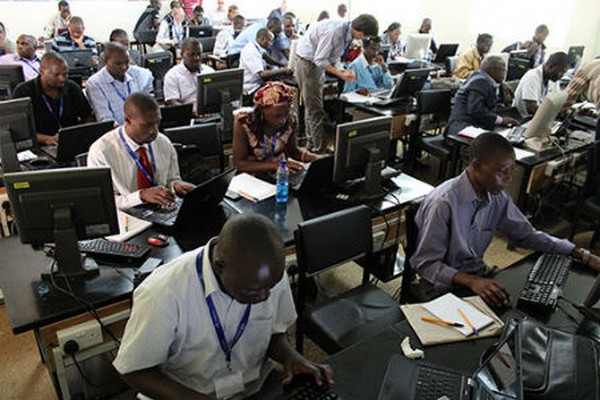By Ramesh Awtaney
In a continent of over a billion people, the ICT market in Africa, excluding South Africa is valued at only USD 10 billion. South Africa’s ICT market is valued at over USD 22 billion. The country alone accounts for about 68 percent of the entire market in Africa, which makes the continent’s figures of USD 32 billion appear skewed. This was revealed by Ramesh Awtaney, Founder and Chairman of iSON Group during his presentation on ‘’Bringing Intellectual Property to Work: Create Onshore Model, Target Offshore Opportunities’’, at the 2017 London Business School’s Africa Business Summit.
The ICT sector requires only one material which is educated youths. Africa seems to have that in abundance. Furthermore, in Africa not only English but French, German, Spanish and Arabic are also widely spoken
Ramesh examined the opportunities in Africa’s ICT sector in relation to India’s industry where ICT is playing a massive role. According to him, ICT is the propelling factor in India’s 6.5 percent average annual GDP growth for past two decades and at present commands a 10% share of the country’s GDP. Also, 38 percent of India’s exports are an ICT services. In the USD 2 trillion economy, the sector rakes USD 100 billion of exports. The best case of ICT export in Africa is that of Kenya, where contribution is 0.06 percent of GDP.
India has been on its ICT journey since the 1990s. Globally, the country represents 55 percent of the ICT offshore market. The USD 100 billion ICT offshore industry has capitalized on the availability of educated youths. This was achieved through the engagement of all stakeholders through training. If the domestic market is included, the sector is worth USD 200 billion. In 2015 approximately 230,000 new jobs were added in India’s ICT sector, while sector’s current overall employment figure remains well north of 10 million. This feat was not achieved on the back of profound innovation or sudden breakthrough. It was a collective determination to get things done by government, academia, and industry experts as a means to fuel economic growth.
What will help create the skills set for the real jobs in Africa is relevant education. Unfortunately, 90 percent of what is taught in African schools today is irrelevant. School’s curricula need to collaborate with industries like ICT, so they can be given specifications of new jobs that are going to be made available. This, in turn, will create the jobs, create the skills that are required, and start an offshore industry
Ramesh is convinced that what India did in 25 years can be achieved by Africa within 5 -10 years if India’s model can be replicated. Like India, all Africa requires is commitment to attain this height. The youth population of India in the age group 15-34, 400 million, while Africa is compared with 300 million youths. The ICT sector requires only one material which is educated youths. Africa seems to have that in abundance. Furthermore, in Africa not only English but French, German, Spanish and Arabic are also widely spoken.
In the 1990s and early 2000, offshore was the buzzword in India as jobs moved from Europe and America to India, whereby know how of processes became the intellectual properties. As economies begin to grow in Africa, there is a need to outsource non – core functions. This can be achieved in two ways. Either one brings the work to intellectual property or knowledge (intellectual property) to work. The Indian model is that of former in which businesses from other countries bring the work to India. This is called work to intellectual property (IP). iSON, when it was founded 6 years ago in Africa, decided to do the latter.
Elaborating further, Ramesh revealed that iSON brought the knowledge from India to Africa instead of taking work from Africa to India. Today, iSON has created over 10,000 jobs, having employed over 20,000 people since its inception Interestingly enough, to create these 10,000 jobs, USD 20 million has been invested. In no other industry can one make an impact of 20,000 jobs with 20 million dollars. With these 20,000 well trained and skilled employees, the ‘’Knowledge Base’’ has been created and this would help propel the growth domestically.
According to him, what will help create the skills set for the real jobs in Africa is relevant education. In today’s Africa, about 80% – 90% of what is taught in schools is irrelevant. School’s curricula need to change. The youth need to be served with relevant education. If schools collaborate with industries like ICT, they can be given specifications of new jobs that are going to be made available. Africa needs to change her curricula to include what is industry relevant. This, in turn, will create the jobs, create the skills that are required, and start an offshore industry.
The ICT growth, we clamor for in Africa cannot be achieved by just going after the domestic requirements. Also, as the ICT industry matures in India, they like to take on more value addition jobs. Companies have grown and evolved in their circle, and aim to move up their billable from $20,000 per employee a year to $80,000 per employee a year. Indian companies are now looking to concentrate on big data analytics. These are the opportunities available in Africa to capture in the outsourcing space of basic IT and ITes.
Offshore requirements have to be a major target, and in order to achieve that, good project management is required. There has to be collaborations between the existing technology ecosystem, academics and key industry players. The government on the other hand, need to formulate policies which encourage offshoring to Africa much like India did in 1990s and early 2000.
Ramesh Awtaney is the Founder and Chairman of iSON Group.


